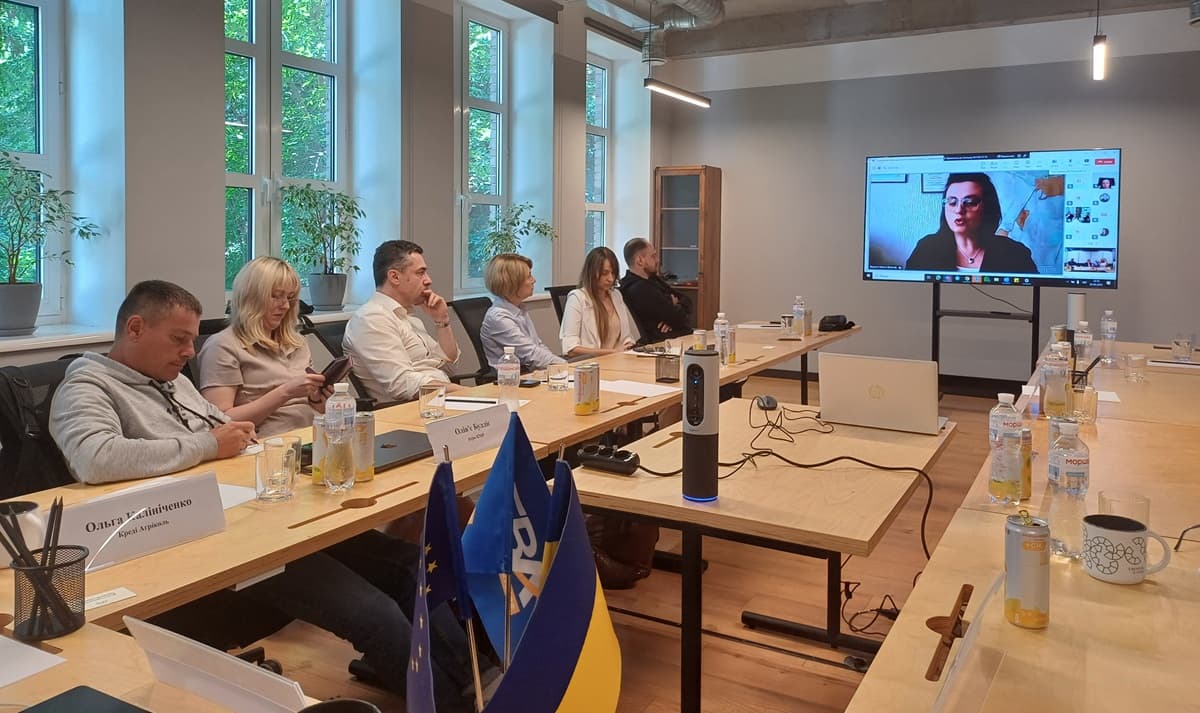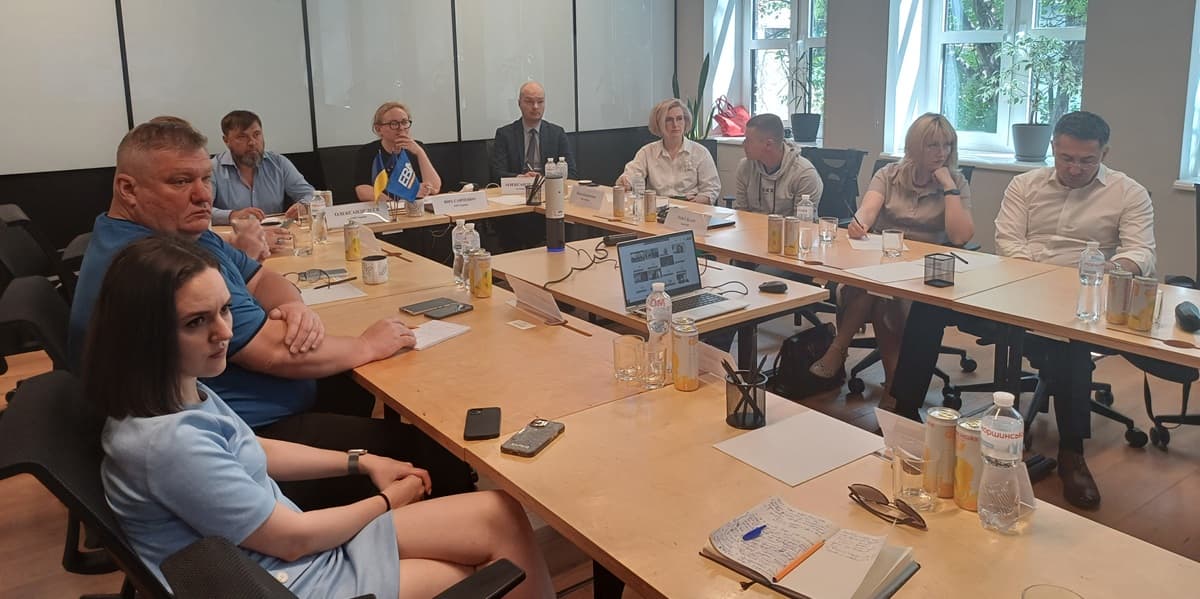On 25 June 2025, the European Business Association (EBA) organised a roundtable discussion on business support in the frontline regions of Ukraine. The event brought together representatives from central and local authorities, businesses and public initiatives.
In accordance with the order of the Ministry for Development of Communities and Territories of Ukraine № 376, dated 28 February 2025, 12 regions of Ukraine, along with the city of Kyiv, have been officially recognised as frontline regions. The list includes Dnipro, Donetsk, Zhytomyr, Zaporizhzhia, Kyiv, Luhansk, Mykolaiv, Odesa, Sumy, Kharkiv, Kherson and Chernihiv regions and the city of Kyiv. This status establishes a special legal regime that allows for the application of special benefits. In particular, this includes creating favourable conditions for attracting foreign investment, implementing business support programmes and introducing economic incentives aimed at restoring and developing these territories.

Through its regional offices in Dnipro, Kharkiv and Odesa, and within the framework of the Recovery Committee, the European Business Association has initiated a series of strategic discussions aimed at supporting businesses in the frontline regions of Ukraine.
One of the key stages of this work will be the participation in the international conference on Ukraine’s recovery (Ukraine Recovery Conference, URC), which will take place in Rome on 10–11 July. Together with the Recovery Committee, the EBA is preparing a presentation website to be launched at the URC. This resource is intended to showcase the Ukrainian regions’ potential to both European and global audience, including international partners, financial institutions, donor organisations, and investors. The aim is to show that Ukrainian regions remain economically active, have institutional capacity, and are prepared to cooperate even in the difficult conditions of war. This is why the discussion covered a wide range of issues, such as how to combine security challenges with business development prospects, which peaceful life practices should be adapted to the new realities and which wartime solutions could form the basis for post-war economic growth.
“Today, we do not simply discuss challenges — we create solutions. The frontline regions of Ukraine have enormous potential, and our task is to showcase this to the world. Businesses, municipalities, cultural institutions — all functioning already, even under fire. We are preparing for the Rome conference, where we will present not only the challenges, but also the examples of resilience, innovation, and partnership. If you have any suggestions on how we can strengthen our support for businesses in these regions, please contact us,” began Vira Savchenko, the event’s moderator, Co-Chair of the EBA Recovery Committee and the CEO of BDO in Ukraine.
Svitlana Mykhailovska, Deputy Director of the European Business Association, opened the discussion. She presented a joint document, developed together with BDO in Ukraine specialists, which contains proposals to support businesses in the frontline regions. Key initiatives include tax breaks, access to credit, risk insurance, infrastructure, digital solutions and support programmes for employees and veterans. Svitlana stressed that real-life cases of Ukrainian companies debunk the myths regarding the impossibility to do business during wartime.
Olga Balytska, Co-Chair of the EBA Recovery Committee, underscored that investing in frontline regions is not only economically viable, but also contributes to societal resilience. She encouraged international partners to view such investments as impact investments in human capital, education, infrastructure and security. Ms Balytska also emphasised that Ukrainian businesses have already developed unique mechanisms for overcoming challenges, ranging from the rapid resumption of production to collaboration between entities.

Government policy and institutional support
Olena Shuliak, Chairwoman of the Committee of the Verkhovna Rada of Ukraine on the Organization of the State Power, Local Self-Government, Regional Development and Urban Planning, highlighted the importance of including businesses in strategic recovery planning. She noted that over 15% of Ukrainian businesses operate in frontline areas and that these businesses provide the tax revenues that support the country’s defence capabilities. Ms Shuliak called on businesses to play a more active role in drawing up the municipality spatial development plans and in developing local compensation and support programmes. She also stressed the need to record damaged business property in the state register to facilitate further compensation.Serhii Sukhomlyn, Head of the State Agency for the Restoration and Development of Infrastructure, presented an approach to prioritising the recovery of frontline regions. He emphasised that investing in these areas is crucial to prevent the loss of human capital. The Agency is implementing projects to restore logistics and water supply, as well as building shelters. It is also introducing new procurement mechanisms that evaluate not only price, but technological solutions. Mr Sukhomlyn also announced the launch of a procurement framework to engage European companies in project design, technical supervision and construction.
The representatives of the Kharkiv and Kherson regional military administrations shared practical case studies.
In his speech, Yevhen Ivanov, a representative of the Kharkiv Regional Military Administration, underscored that enterprises in the region continue to operate despite constant shelling, demonstrating exceptional resilience. He noted the high demand for grant programmes for small businesses that have already shown their effectiveness, and called for such programmes to be scaled up. Mr Ivanov drew particular attention to the issue of reverse relocation, noting that most businesses forced to leave the region do not return due to the challenging security situation. Against this backdrop, he stressed the importance of introducing a special economic status for frontline areas to preserve the existing businesses, stimulate their growth, and prevent the loss of human capital.During the event, Artem Mishyn, Director of the Economics Department at the Kherson Regional Military Administration, outlined the region’s key challenges and achievements following the de-occupation. He noted that the Kherson region had suffered large-scale destruction and that not a single entity was able to relocate due to the occupation’s rapid onset. The main areas of operation following liberation were the demining and the restoration of state institutions, tax services and banking infrastructure.
Mr Mishyn paid particular attention to the agricultural sector, noting that more than 300 farms have resumed operations despite the constant shelling. The agrarians are pooling resources to share imported machinery and compensate for the loss of their own equipment. He also noted the positive trend in entrepreneurs’ participation in government support programmes, especially the growth of the 5-7-9 programme portfolio by more than UAH 800 million and the significant increase in microgrant applications following the lifting of restrictions.
He also emphasised that, despite a fivefold drop in local budget revenues, business remains a key source of their income. The signals indicating the resilience of the Kherson region and its readiness to attract investment include the resumption of irrigation, farmers’ cooperation, the launch of new production facilities, and the return of entrepreneurs to the region.
Financial instruments and insurance
Denys Garasiuta, a representative of the Export Credit Agency of Ukraine (ECA), presented financial instruments that enable investments to be insured against war risks. This creates opportunities for attracting foreign capital, even to regions on the front line. The ECA also offers bank loan insurance, allowing businesses to obtain financing without providing additional collateral.
Cultural Landing
Mykola Serha, the founder of the Cultural Landing initiative, emphasised the importance of culture and veteran entrepreneurship in the recovery process. He explained that cultural projects increase the psychological resilience of municipalities, facilitate the reintegration of veterans, and establish the trust necessary for investment.
Business as a driver of recovery
Yuriy Atanasov, the CEO of Centravis Production Ukraine, explained how the company has continued to produce seamless pipes in Nikopol despite the daily shelling. In 2023, Centravis opened a new shop and increased production by 12%. He also underscored the importance of government support, such as employee reservations and VAT refunds.Olena Biziaieva, HR Director at ArcelorMittal Kryvyi Rih, said that the company had almost doubled its steel production in 2024 in order to adapt to energy challenges. The company currently has over 1,000 job vacancies and is seeking to recruit veterans and internally displaced persons.
Kostiantyn Furman, the representative of Agrofusion (Mykolaiv), shared his company’s experience in the agricultural sector. After some of their fields were occupied, they resumed production of tomato paste, provided employees with mobile housing, and planned the sowing season in the liberated territories. He also highlighted the importance of streamlining the demining procedures and improving the access to financing.
Ihor Balaka, the representative of the Kharkiv business community, accentuated the need to focus not only on attracting new investors, but also on preserving existing businesses in frontline regions. He stressed that constant calls for relocation do not consider the realities faced by businesses that are deeply integrated into local municipalities. According to Balaka, losing businesses means losing people, skilled personnel and economic activity.
Mr Ihor called for a special economic status to be introduced for frontline areas, stressing that the conditions for regions under shellfire cannot be equal to those in the rear. He also cited examples of horizontal cooperation between municipalities, such as the twinning agreement between Irpin and Chuhuiv, as well as humanitarian demining initiatives. Finally, he emphasised that businesses in frontline regions require systemic solutions to survive and continue operating, as well as support.

In summary, despite the extremely challenging conditions, Ukrainian businesses in the frontline regions have demonstrated resilience, adaptability and a readiness to develop. The case studies presented from Kharkiv, Kherson, Mykolaiv, Kryvyi Rih and Nikopol proved that companies are able to maintain and increase production, introduce innovations, create new jobs and attract international support even under fire.
The event participants agreed on the need for the following:
- Introducing a special economic status for the frontline areas to create favourable conditions for business preservation and development.
- Scaling up investment insurance programmes against war risks, which are already being implemented through the Export Credit Agency of Ukraine.
- Expanding access to finance, particularly through the 5-7-9 programme, grant initiatives for small businesses, and compensation mechanisms for businesses that have suffered damage.
- Institutional support for veterans through their involvement in entrepreneurship, retraining and cultural initiatives.
- Support for the agricultural sector, including simplifying demining procedures, restoring irrigation, and promoting cooperation.
- Integrating businesses into the strategic planning of municipalities, including updating urban planning documents and spatial development plans.
- Enhancing the role of culture as a tool for psychological resilience, reintegration and building trust in the regions.
In preparation for the International Conference on Ukraine’s Recovery (URC) in Rome, the European Business Association and its partners are preparing
- Visual materials showcasing resilience and innovation in the regions
- Presentations of financial instruments for investors
- Contact points for international cooperation
- A platform for sharing experience between municipalities (twinning mechanism)
- A summary document containing recommendations for the government and international partners.
This event not only provided a platform for sharing experiences, but also marked the beginning of the development of a new recovery policy that focuses on businesses, municipalities and individuals.
If you have a proposal, initiative or idea to support businesses in the frontline regions, including investment, financing, cultural or infrastructure projects, the team of BDO in Ukraine is open to cooperation. Please, contact us at info@bdo.ua and we will be happy to discuss partnership opportunities or the joint implementation of solutions that will contribute to the recovery and development of Ukrainian regions.
